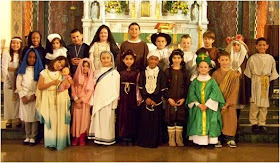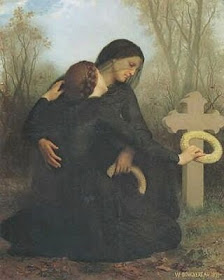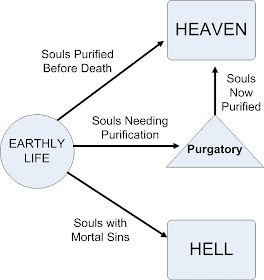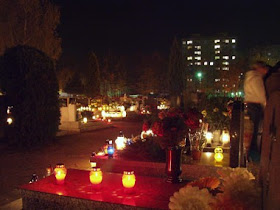All Saints' Day
November 1
All Saints Day, the day on which Catholics celebrate all the saints, known and unknown, is a surprisingly old feast. It arose out of the Christian tradition of celebrating the martyrdom of saints on the anniversary of their martyrdom. When martyrdoms increased during the persecutions of the late Roman Empire, local dioceses instituted a common feast day in order to ensure that all martyrs, known and unknown, were properly honored.
The current date of November 1 was instituted by Pope Gregory III (731-741), when he consecrated a chapel to all the martyrs in St. Peter's Basilica in Rome and ordered an annual celebration. This celebration was originally confined to the diocese of Rome, but Pope Gregory IV (827-844) extended the feast to the entire Church and ordered it to be celebrated on November 1.
The vigil or eve of the feast, October 31, is commonly known as All Hallows Eve, or Halloween. Despite concerns among some Christians (including some Catholics) in recent years about the "pagan origins" of Halloween (see Halloween, Jack Chick, and Anti-Catholicism), the vigil was celebrated from the beginning—long before Irish practices, stripped of their pagan origins (just as the Christmas tree was stripped of similar connotations), were incorporated into popular celebrations of the feast.
Excerpts taken from:
 |
| Vision of heaven, the New Jerusalem |
All Saints' Day (in the Roman Catholic Church officially the Solemnity of All Saints and also called All Hallows or Hallowmas), often shortened to All Saints, is a solemnity celebrated on the First of November by parts of Western Christianity, and on the first Sunday after Pentecost in Eastern Christianity, in honour of all the saints, known and unknown. In the Western calendar it is the day after Halloween and the day before All Souls' Day.
In Western Christian theology, the day commemorates all those who have attained the beatific vision in Heaven. It is a national holiday in many historically Catholic countries. In the Catholic Church and many Anglican churches, the next day specifically commemorates the departed faithful who have not yet been purified and reached heaven.
In Western Christian theology, the day commemorates all those who have attained the beatific vision in Heaven. It is a national holiday in many historically Catholic countries. In the Catholic Church and many Anglican churches, the next day specifically commemorates the departed faithful who have not yet been purified and reached heaven.
 |
All Saints' Day at a cemetery in
Sanok, Poland - flowers and lighted candles honor the memory of deceased relatives.
Christians who celebrate All Saints' Day and All Souls' Day do so in the fundamental belief that there is a prayerful spiritual bond between those in purgatory (the 'Church Suffering'), those in heaven (the 'Church triumphant'), and the living (the 'Church militant'). Other Christian traditions define, remember and respond to the saints in different ways; for example, in the Methodist Church, the word "saints" refers to all Christians and therefore, on All Saints' Day, the Church Universal, as well as the deceased members of a local congregation, are honoured and remembered.
Excerpts taken from http://en.wikipedia.org/wiki/All_Saints'_Day
Homily for the Solemnity of All Saints
By Fr Munachi Ezeogu, cssp
Why is it necessary to celebrate the feast of all saints?
All year round we are celebrating feasts of saints: Thomas Aquinas, January 28;
Augustine of Hippo, August 28; Theresa of Lisieux, October 1, etc. Why then is it
necessary to set apart a day to celebrate the feast of all saints? I can think
of two important reasons.
1. Beside the handful of saints whose feast days we
celebrate on specific days in the year, there are countless other saints and
martyrs, men, women and children united with God in the heavenly glory whom we
do not celebrate. Many of these would be our own parents and grand-parents who
were heroic women and men of faith. Today we keep their honourable memory. In
many ways, therefore, today's feast can be called the feast of the Unknown
Saint, in line with the tradition of the Unknown Soldier. We celebrate what the
first reading calls "a great multitude that no one could count, from every
nation, from all tribes and peoples and languages, standing before the throne
and before the Lamb, robed in white, with palm branches in their hands"
(Rev 7:9).
 |
| All Saints Day Mass |
2. This celebration gives us a peek into our eternal
destiny. The saints we celebrate were men and women like us. Where we are now
they used to be, and where they are now we hope to be someday. As Christians we
know that a person's life story is not limited to what happens to them between
the day they are born and the day they die. Our story starts before we are
born, at our conception, and goes beyond the day we die, to all eternity. That
is why we do not simply forget people after they die. Didn't St Theresa of
Lisieux say that she would spend eternity doing good on earth? In our mortal
eyes she is dead and gone. But in the eyes of faith we know that she is alive
now more than ever, because she is now fully alive in God. She is now more
alive than we are because the life she now enjoys can no longer be diminished
by suffering, disease and sin, or death.
Unfortunately, our reaching the fullness of life with the
saints does not happen automatically. "Not everyone who says to me, 'Lord,
Lord,' will enter the kingdom of heaven, but only the one who does the will of
my Father in heaven" (Matthew 7:21). How do we live a life of doing the
will of our heavenly Father? The answer is given us in today's gospel, the
Beatitudes, where Jesus gives his followers a road map to a happy eternity. All
the saints we celebrate today walked the hard and narrow path of the Beatitudes
to arrive at heavenly bliss. On the feast of All Saints the church invites us
and challenges us to walk the walk, not just to talk the talk, of the saints.
The Beatitudes propose to us a way of life, inviting us to
identify with the poor, those who mourn, the meek, and those who hunger and
thirst after justice. They challenge us to be compassionate people, to be men
and women who are pure in heart, and to become the peacemakers in our dealings
with one another, in our families and in the society at large, even when this
approach to things exposes us to ridicule and persecution. None of the saints
we celebrate today had it as their aim in life to amass wealth, to acquire
power or to gain popularity. Rather they looked forward to the eternal reward
which God gives to his faithful ones at the end of this short earthly life of
illusion.
 |
| Children dressed as their favorite Saint |
Today we are invited to walk the path of the saints, the way
of the Beatitudes. The way is narrow and hard. We need faith and courage to
walk it. The example of the saints and their prayers encourage us and help us
on. St Augustine found it hard to live the Beatitudes, but when he read the
lives of the saints he said, "What these ordinary women and men have done,
why not me?" Why not? Faith assures us all who heed the call of Jesus and
live the life of the Beatitudes that at the end of life we shall, together with
all the saints, hear the consoling words of the Lord, "Well done, good and
faithful servant, enter into the joys of your master" (Matthew 25:21).
Thankyou, Fr Munachi Ezeogu http://www.munachi.com/z/allsaints.htm
All Souls' Day November 2
In Western Christianity, this day is observed principally in the Catholic Church, although some churches of Anglican Communion and the Old Catholic Churches also celebrate it. The Eastern Orthodox Church observes several All Souls' Days during the year.
In other words, when they died, they had not yet attained
full sanctification and moral perfection, a requirement for entrance into
Heaven. This sanctification is carried out posthumously in Purgatory.
 |
| Souls in Purgatory Angels assisting them through the Graces of Mary Mother of God |
All Soul's Night Irish Folklore
 |
| Souls of the Dead wandering on All Soul's Night |
All Soul's Night is when the walls between the worlds grow thin and spirits
of the underworld walk the Earth.
On All Soul's Night a Rosary of fifteen decades was said, and food and drink
were left on the kitchen table during the night for the departed souls of the
family, who, it was believed, returned on this night. Mashed potatoes and
spirits, such as poteen, were the normal offerings on such occasions. The people
generally believed that the spirits of the dead remained in the household until
twelve noon on the following day.
It was the custom on this night to sweep the kitchen floor carefully and put
on a good fire to welcome the souls of dead relatives who were still in
Purgatory. On the following morning the discerning eye could see the mark of
feet in the ashes. If the footprints indicated a person facing the fire all was
well but if they pointed towards the door a death would take place in the family
during the coming year.
http://www.movilleinishowen.com/history/folklore/all_souls_night.htmThere is a Mexican saying that we die three deaths:
the first when our bodies die,
the second when our bodies are
lowered into the earth out of sight, and
the third when our loved ones forget
us.
Catholics forestall that last death by seeing the faithful dead as members
of the Church, alive in Christ, and by praying for them -- and asking their
prayers for us -- always.
Cardinal Wiseman wrote in his Lecture XI:
"Sweet is the consolation of the dying man, who, conscious of imperfection, believes that there are others to make intercession for him, when his own time for merit has expired; soothing to the afflicted survivors the thought that they possess powerful means of relieving their friend.
In the first moments of grief, this sentiment will often overpower religious prejudice, cast down the unbeliever on his knees beside the remains of his friend and snatch from him an unconscious prayer for rest; it is an impulse of nature which for the moment, aided by the analogies of revealed truth, seizes at once upon this consoling belief. But it is only a flitting and melancholy light, while the Catholic feeling, cheering though with solemn dimness, resembles the unfailing lamp, which the piety of the ancients is said to have hung before the sepulchres of their dead."
Though
we should daily pray for the dead in Purgatory, above all for our ancestors, today is
especially set aside for hanging that "unfailing lamp before the
sepulchres of our dead" as we are told to do by Sacred Scripture:
"And making a gathering, [Judas] sent twelve thousand drachms of silver to Jerusalem for sacrifice to be offered for the sins of the dead, thinking well and religiously concerning the resurrection,
(For if he had not hoped that they that were slain should rise again, it would have seemed superfluous and vain to pray for the dead,)
And because he considered that they who had fallen asleep with godliness, had great grace laid up for them. It is therefore a holy and wholesome thought to pray for the dead, that they may be loosed from sins."
II
Maccabees 12: 43-46
 |
| Book of Maccabees 12: 43-46 |
At the
three Masses offered today, the glorious Sequence "Dies
Irae" (also used in Requiem Masses, i.e., Masses for the Dead) will be
recited after the Epistle, Gradual, and Tract ("Dies Irae" means "Day of
Wrath").
Between Noon of November 1 and Midnight tonight, a person who has been to confession and Communion can gain a plenary indulgence, under the usual conditions, for the poor souls each time he visits a church or public oratory and recites the Our Father, the Hail Mary and the Glory be to the Father six times. This is a special exception to the ordinary law of the Church according to which a plenary indulgence for the same work can be gained only once a day. Because of this, some of the customs described below may be begun on All Saints Day.
Also, the faithful who, during the period of eight days from All Saints Day, visit a cemetery and pray for the dead may gain a plenary indulgence, under the usual conditions, on each day of the Octave, applicable only to the dead.
Between Noon of November 1 and Midnight tonight, a person who has been to confession and Communion can gain a plenary indulgence, under the usual conditions, for the poor souls each time he visits a church or public oratory and recites the Our Father, the Hail Mary and the Glory be to the Father six times. This is a special exception to the ordinary law of the Church according to which a plenary indulgence for the same work can be gained only once a day. Because of this, some of the customs described below may be begun on All Saints Day.
Also, the faithful who, during the period of eight days from All Saints Day, visit a cemetery and pray for the dead may gain a plenary indulgence, under the usual conditions, on each day of the Octave, applicable only to the dead.
Catholics also pray
this prayer for the dead anytime throughout the year, and whenever they pass a
cemetery.
Many families pray a Rosary nightly for the
dead throughout the Octave of All Saints, replacing the Fatima prayer with the
Eternal Rest prayer...
Here is a
simple invocation for the dead, called the "Eternal Rest" prayer:
Eternal rest grant unto him/her (them), O Lord; and let perpetual light shine upon him/her (them). May he/she (they) rest in peace. Amen.
Latin version:
Réquiem ætérnam dona ei (eis) Dómine; et lux perpétua lúceat ei (eis). Requiéscat (Requiéscant) in pace. Amen.
Customs
It is practically universal folk belief that the souls in
Purgatory are allowed to return to earth on All Souls Day. In Austria, they are
said to wander the forests, praying for release. In Poland, they are said to
visit their parish churches at midnight, where a light can be seen because of
their presence. Afterward, they visit their families, and to make them welcome,
a door or window is left open. In many places, a place is set for the dead at
supper, or food is otherwise left out for them. In any case, throughout the
Octave of All Saints, our beloved dead Flores
para los muertosshould be remembered, commemorated, and prayed for.
During our visits to their graves, we spruce up their resting
sites, sprinkling them with holy water, leaving votive candles, and adorning
them flowers (especially chrysanthemums and marigolds) to symbolize the
Eden-like paradise that man was created to enjoy, and may, if saved, enjoy
after death and any needed purgation.
Today is a good day to not only remember the dead
spiritually, but to tell your children about their ancestors. Bring out those
old photo albums and family trees! Write down your family's stories for your
children and grandchildren! Impress upon them the importance of their
ancestors! Bring to their minds these words from Ecclesiasticus:
Let us now praise men of renown,
and our fathers in their generation.
The Lord hath wrought great glory
through his magnificence from the beginning.
Such as have borne rule in their dominions,
men of great power, and endued with
their wisdom,
shewing forth in the prophets the dignity of prophets,
And ruling
over the present people,
and by the strength of wisdom instructing
the people
in most holy words.
Such as by their skill sought out musical tunes,
and
published canticles of the scriptures.
Rich men in virtue, studying
beautifulness:
living at peace in their houses.
All these have gained glory in
their generations,
and were praised in their days.
They that were born of them
have
left a name behind them,
that their praises might be related:
who are perished, as if they had never been:
and are become as if
they had never been born,
and their children with them.
But these were men of
mercy,
whose godly deeds have not failed:
Good things continue with their seed,
Their posterity are a holy inheritance,
and their seed hath stood in the
covenants.
And their children for their sakes remain for ever:
their seed and
their glory shall not be forsaken.
Their bodies are buried in peace,
and their
name liveth unto generation and generation.
Let the people shew forth their
wisdom,
and the Church declare their praise.
Ecclesiasticus 44:1-15
Excerpts taken from
Stories of the dead --
"As Saint Augustine saith: Sometimes souls be punished in the places where they have
sinned, as appeareth by an ensample that Saint Gregory reciteth in the fourth book
of his Dialogues, and saith that there was a priest which used gladly a bath,
and when he came in to the bath he found a man whom he knew always ready for to
serve him.
And it happened on a day, that for his diligent service and his reward, the priest gave to him a holy loaf. And he weeping, answered: Father, wherefore givest thou me this thing? I may not eat it for it is holy. I was sometime lord of this place, but after my death, I was deputed for to serve here for my sins, but I pray thee that thou wilt offer this bread unto Almighty God for my sins, and know thou for certain that thy prayer shall be heard, and when then thou shalt come to wash thee, thou shalt not find me. And then this priest offered a week entire sacrifice to God for him, and when he came again he found him not."
And it happened on a day, that for his diligent service and his reward, the priest gave to him a holy loaf. And he weeping, answered: Father, wherefore givest thou me this thing? I may not eat it for it is holy. I was sometime lord of this place, but after my death, I was deputed for to serve here for my sins, but I pray thee that thou wilt offer this bread unto Almighty God for my sins, and know thou for certain that thy prayer shall be heard, and when then thou shalt come to wash thee, thou shalt not find me. And then this priest offered a week entire sacrifice to God for him, and when he came again he found him not."
More stories at http://www.fisheaters.com/customstimeafterpentecost12ac.html
|
|










No comments:
Post a Comment